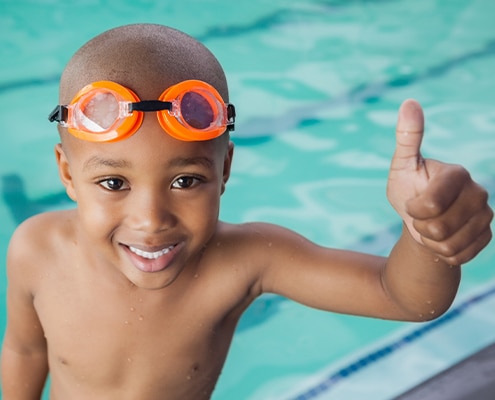 You probably know that swimming is an important skill and that it can also be tons of fun, but did you know that swimming is also good for your child’s development? Here’s how.
You probably know that swimming is an important skill and that it can also be tons of fun, but did you know that swimming is also good for your child’s development? Here’s how.
Fine And Gross Motor Skills
Children who learn to swim tend to develop both fine and gross motor skills faster than their non-swimming peers. In one study, children who learned to swim before the age of five had better balance than children who could not swim. They were also better at coloring inside the lines and using scissors to cut paper.
Coordination
Swimming uses the entire body, so it’s a great activity to help children with coordination. When your child kicks, he or she is learning to coordinate the movements of both sides of the body. The same is true for moving the arms.
Strength
It’s not easy to move through the water! You’ve probably heard that swimming is a great exercise, and that’s why. The water creates resistance, so when your child moves through it, he or she is building muscle and strength.
Spending time in the water even helps babies develop the muscles they need to hold their heads upright. Plus, all the splashing and playing they’ll do in the water helps strengthen their joints, too.
And it’s not only your child’s skeletal muscles that get stronger when they learn to swim. Swimming also strengthens their heart, lungs, and blood vessels, too!
Cognition
All that movement and coordination also helps build neurons in your child’s brain. That means swimming can help your child develop stronger academic skills, too.
One study by Griffith University found that young swimmers had vocabularies 11 months ahead of the non-swimming population. They were also more advanced in literacy and math.
Furthermore, the swimmers demonstrated a 17-month lead-in story recall, and they were able to understand directions at a rate 20 months ahead of their peers!
Confidence
Studies have found that children who learn to swim are more confident and independent than their peers who don’t swim. They demonstrate greater comfort in new situations, along with higher self-esteem and better self-control.
Swimming lessons for young children also often involve parents (all our lessons for very young swimmers do!). That means a child is learning with the support of a parent and receives praise from both the parent and the instructor as he or she masters new skills. All that support is bound to increase self-esteem and confidence.
Social Skills
Because lessons are often given in group settings, children who take swimming lessons get to practice early on in interacting positively with other children and adults. They also learn to share supplies and play with other children during games.
Additionally, they’ll be excited to communicate their achievements to their friends and parents. Plus, since parents take part in lessons for young children, it’s also a great way to get in some quality one-on-one time and increase family bonds.
Sleep And Appetite
Swimming is hard work! Your child is bound to work up an appetite. That’s great to help pickier eaters, and it encourages your child to get the nutrition he or she needs to grow.
Because swimming uses so much energy, it will also help your child’s sleeping patterns. That’s good news if your child is often reluctant to go to bed! And it helps babies sleep earlier and longer, too.
Swimming is an activity that benefits virtually every area of your child’s life, from his or her physical development to social skills, to increase his or her capacity for learning. Plus, it’s a lot of fun and may even help keep your child from drowning if he or she ever unexpectedly falls into the water.
If you’d like to learn more about how swimming can help your child’s development or you’re ready to enroll your child in lessons, just reach out to us using our easy contact form.
